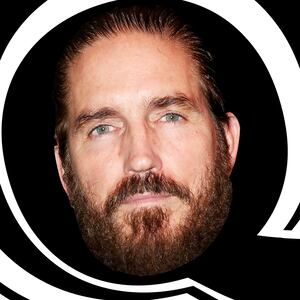Sean Hannity and other right-wing types are in a gleeful tizzy over a song from rapper Bryson Grey, which contains some anti-vax lyrics and the phrase “Let’s Go Brandon,” a tortured MAGA inside joke that basically means “Fuck Biden.” The tune is part of a growing oeuvre of pro-Trump songs that take aim at the right’s favorite pandemic-era bogeymen, including the Democratic president, vaccine mandates, and the country of Australia (because of its strict COVID-era lockdown policies).
Grey’s song also features homophobic lyrics and is just generally pretty ugly; that hasn’t stopped Hannity from plugging it, twice, on his Twitter feed.
“My timeline is just filled with these MAGA rappers,” Fever Dreams co-host Will Sommer discloses on this week’s episode of the podcast.
ADVERTISEMENT
Elsewhere on the show, Sommer and guest host Kelly Weill discuss how Mel Gibson’s Jesus—aka actor Jim Caviezel—has “emerged from his chrysalis as a QAnon butterfly.” The actor has put out a video talking about adrenochrome and the blood of trafficked children and appeared as a star guest at a Las Vegas QAnon event this weekend where he read a speech from Braveheart. Also at the conference with Caviezel: another rising luminary in the fringe movement, Juan O. Savin, who is a “sort of celebrity QAnon whisperer.” Savin appeared at the confab with “a copy of a dress Melania once wore” and started “dissecting the symbols of how her dress is a QAnon thing.”
A “strange little guy” who is actually an insurance investigator from the Pacific Northwest—“his whole thing is he kind of acts like a cowboy, he wears a lot of cowboy hats and fringe and stuff,” Sommer explains—Savin has become “really tight with Roseanne” and “has obtained this strange hold over these celebrities.” Oh, and he plays into the right’s conspiratorial belief that he’s really JFK Jr., because, Boomers.
Of course, conspiracies don’t discriminate by generation, and this week’s guest, writer EJ Dickson from Rolling Stone, gives a rollicking tour through the red pills of TikTok, where Gen Z is finding Pizzagate for the first time, obsessing over Gabby Petito’s murder, and falling in love with Scientology personality quizzes.
Dickson, who also co-hosts the Don’t Let This Flop podcast, notes that the platform was “a bastion of conspiracies of all sorts in the early days of the pandemic. And it was home to a lot of the 5G conspiracy theories, a lot of conspiracy theories about how the vaccine—which didn’t even exist at that point—was a mark of the beast.”
“What’s really been striking about covering this sort of misinformation is that it’s really age-old stories repackaged in new boxes,” she adds. “I would say that in theory, [TikTok] talks a big game about curbing misinformation on the platform and they have a lot of guidelines that specifically relate to it. But, in practice, I don’t really see it implemented very often.”
Finally, this week marked the start of the civil court case over the white supremacist violence in Charlottesville, Virginia. Weill explains the origins of the lawsuit, which takes aim at many of the organizers of the deadly Unite the Right event: “The plaintiffs in this case are nine people who were affected by Unite the Right. They were people who were attacked during that torchlight rally. They were people who were in the crowd when James Fields, Jr. drove his car into anti-racist protesters. There’s a preacher who was pretty viciously harassed.” The lawsuit has involved dramatic developments even before landing in court—“it has led to the arrest of one Neo-Nazi who just wouldn't turn over court order documents. So he got chucked in jail for contempt of court. It’s led to tens of thousands in fines and sanctions against far-right figures and groups,” Weill notes. “It’s led to the release of some really damning, and in my opinion, very embarrassing text messages between white supremacists, like one texting Richard Spencer, like, ‘you are my liege.’”
The discovery process has also uncovered texts on right-wing platforms where organizers talked about hitting counter-protesters with cars—“it’s something that people discussed at length”—as well as other messages that “really undercut the defendants’ argument that this was spontaneous violence...they’re talking about organizational structures, they’re organizing carpools, they’re talking about, just, gleeful anticipation of possible violence.”
As Sommer notes, there are parallels to the trials of the Jan. 6 rioters—particularly around how much of the violence was pre-planned—so the Charlottesville case will be one to watch. As Weill asks, “What culpability do leaders have over a violent follower?”
Listen, and subscribe, to Fever Dreams on Apple Podcasts, Spotify, and Stitcher.








